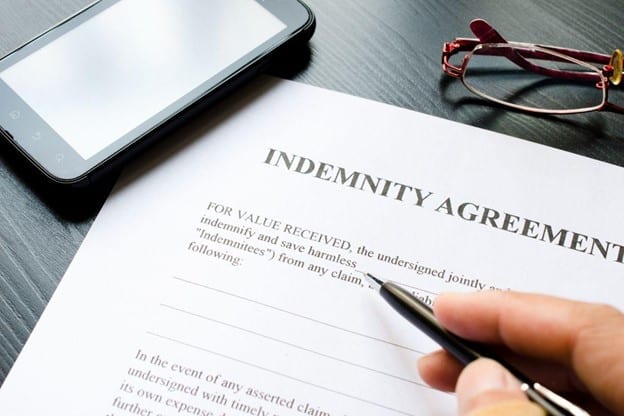
Intellectual property rights are a critical element of modern business agreements and the question of IP infringement claims is a financially serious one. You might have heard of how IP infringement indemnity can assist businesses to deal with another party's intellectual property rights being infringed.
IP infringement indemnity is an important yet complicated topic for businesses to consider. To help you gain a firmer understanding of the subject, IP Guardian has put together this primer on IP infringement indemnitiesin commercial transactions. Read on to discover everything you need to know about this crucial issue.
Contact IP Guardian today to chat with experienced, knowledgeable intellectual property lawyers. You'll receive a free consultation, quality advice, and fixed-fee pricing.
An indemnity is a promise by one party to compensate the other for a defined loss during a contract's performance. It is a way of apportioning risk between contracting parties, and provides a contractual right for compensation corresponding to a specific loss. If one party agrees to indemnify the other for a particular kind of loss, if that loss comes to pass, they must reimburse them.

IP infringement indemnities are provisions in agreements were parties shift risk of loss in case of IP infringement. Typically, IP infringement indemnity agreements obligate one party to compensate the other for damages or losses the liability clause covers. This can even extend to being obliged to defend the other party in any subsequent legal disputes involving a third party claim of IP infringement.
Given the considerable expense litigation incurs, an IP infringement indemnification clause or agreement can offer significant protection to an indemnified party, mitigating risk and liability should IP infringement issues arise.
The IP indemnity obligations will vary based on factors such as:
A common IP indemnity example is an indemnified seller of IP-infringing goods shifting the task of defending the litigation to the supplier of the goods.Some other types of agreements that might include IP indemnification clauses:

In Australia, the legal principle of caveat emptor — "buyer beware" — applies whenever a buyer makes a purchase, and means that the law does not afford protection against faults or losses, including IP infringement. Consequently, buyers often seek protection through the use of a warranty or indemnity, while sellers seek to protect themselves by restricting the scope of this warranty or indemnity.
IP warranties and IP indemnities are subtly different. A warranty is a contractual assurance from a seller about a product or service. If the warranty is breached, the buyer can make a warranty claim and receive damages for the breach. A serious enough breach may allow the buyer to terminate the contract. An indemnity, on the other hand, is a legally enforceable promise to compensate the buyer for a specific type of loss. A breach of contract does not need to have occurred (as in a third-party IP infringement indemnity clause), as long as the loss is described in the IP indemnity clause itself.
A well-crafted intellectual property indemnity provision aids in allocating the risk of litigation for an IP infringement claim. Arranging effective IP indemnification from the outset of a commercial transaction will protect your business, whether as a buyer or seller.
When it comes to drafting indemnification agreements, particular care must be paid to the type of IP rights and precise circumstances that render a party liable. In the absence of clear indemnity terms, parties can become mired in indemnity disputes or even IP indemnification litigation.
For that reason, comprehensive and careful IP indemnity agreements are vital. Businesses must ensure they employ experienced and knowledgeable IP lawyers to draft, review and revise these agreements.
For further advice about indemnity for IP infringement, contact us today to speak with one of our expert intellectual property lawyers. We provide quality and affordable advice including a free consultation and fixed-fee pricing.

Registered Patent and Trade Mark Attorney with significant experience obtaining all forms of registered intellectual property. I hold a Bachelor of Science in Engineering, a Masters of Business Administration and a Masters of Intellectual Property. I’m passionate about showing my clients how they can protect their brands through trademark registrations.
I found them online and initially I was bit hesitant to talk to them about my problem but when I spoke to Barry, I felt more comfortable, and he gave me all the information and advice I wanted without even thinking that I am going to give him business or not. Finally, I went with them, and they made the entire process so smooth and easy for me. john was keeping us updated with each step he was doing. I would recommend these guys for any patent or trademark related service.
I would like to express my thanks to Barry and his team at IP Guardian in Sydney for their assistance with our recent Trademark application. Barry was highly professional, readily available throughout the process and clearly communicated expectations. Barry even helped us refine our application so that we had a greater chance of success which was very much appreciated to avoid extra costs. I would highly recommend Ip Guardian for all your Trademark and Intellectual Property needs.
Barry, last week, you and your professional team, made my year (or probably my next 21 years). So thank you so much for your executive, calm yet very effective actions under extream pressure. Elias Hajjar, Director, TROLLEYON PTY LTD
Informative, understood the business, what it needed and answered questions in a friendly and approachable manner. Easy decision to continue working with IPGuardian for future trademarking
From the day I contacted Barry Meskin until now with my silly amateur questions, he has been nothing short of amazing. I actually NEVER leave reviews anywhere, but I felt the need to do so for Barry and his team. I myself am a tradie, so I felt intimidated speaking to an attorney. But the second I spoke to him on the phone, he made me feel right at home. Never pressured me into any decisions, yet when I decided to go ahead with him, he delivered what I needed much quicker than what I was expecting. I cannot speak highly enough of him and recommend his services 100%.
The team at IP Guardian have made the process extremely straight forward and easy for us to understand exactly what was required. I will highly recommend to our clients who need help with IP.
I have dealt with Barry over the years, his advice and experience has helped me greatly. Looking for to working with him and his team again. Maher.
IP Guardian helps protect words, symbols, letters, numbers, names, signatures, phrases, sounds, shapes and smells. Yes, I said smells.
We've had the pleasure to work closely with Barry for many years. He has been exceptional to deal with and has a keen focus in providing a commercial led IP "go to market" strategy for start-ups and well known brands. Makes it easy and always advises on different ways to navigate through the IP process.
Barry Meskin @ IP Guardian is an experienced and extremely knowledgeable expert in the domain of intellectual property, patents and trademarks. In addition he has been extremely responsive and very professional in all our dealings. I wholeheartedly recommend Barry's services to any business or anyone seeking advice in this area - great quality and great value.